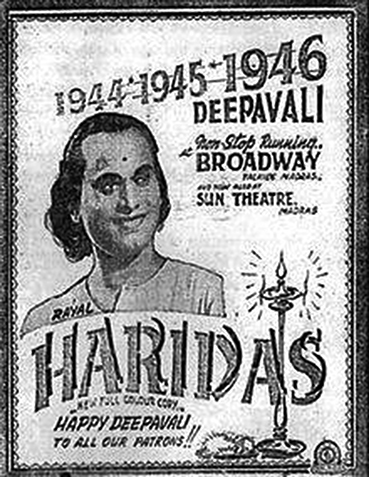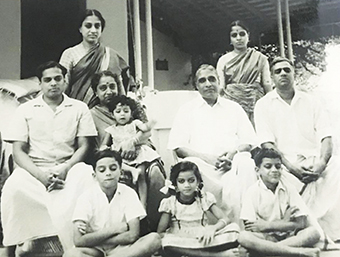‘Haridas’ created a record of the sorts witnessing three Diwalis from 1944. And Coimbatore takes pride in being filmed at famed Central Studios and the blockbuster movie was directed by Sundar Rao Nadkarni with M.K.Thyagaraja Bhagavathar in the lead role. (The first Super Star of Tamil cinema).
The Konkani Brahmin Sundar Rao Nadkarni belonged to Mangalore. He was a busy film maker during the formative years of Indian cinema. Nadkarni began by being a part of Bengaluru based Surya Films, a well known silent movie venture. Subsequently, he moved to Mumbai and while working as a technician, Nadkarni picked up skills which gave him an edge in editing and cinematography. Destiny brought him to Chennai and he had come down as a demonstrator and guide at Sundaram Sound Studio. It was at Chennai that Nadkarni became a top class cinematographer, editor and film maker. Nadkarni knew Marathi and therefore he introduced a number of stories and subjects from Marathi into Tamil cinema. ‘Raja Bhakthi’ was an adaptation of the Marathi play ‘Rakshashi Mahatwa Kanksha’ and it had been written by the famous playwright Veer Vamanrao Joshi. 
The ‘Maha Bhaktha Vijayam’ is kind of the ‘Periya Puranam’ or ‘Thiruvilayadal Puranam’ of Western and Northern parts of the country. Several books, novels, plays and movies are based on this famous book of stories. Nadkarni was a pioneer in this kind of adaptation. The stories talked about family values, humility, kindness, devotion to God and parents among other things. A number of movies were made based on this story collection including ‘Tukaram’ starring Musiri Subramanya Iyer in the year 1938. It was the first movie to be made at the Central Studios. The Central Studios Limited was taken over by the maverick entrepreneur B.Rangaswamy Naidu (1900 – 1943) of Rajalakshmi Mills in the year 1940. B.Rangaswamy Naidu (BR) was keen to take the studio forward with the best of resources and therefore he had purchased a lot of film. Fortunately for BR, the shortage caused by the second world war came in handy and his ‘purchase’ had become a money spinner. He had kind of recovered most of the money spent on the acquisition through the sale of film.
The Brirish Government had also imposed a lot of conditions on the import and usage of film. Therefore it was not possible to make movies beyond 11000 feet and the block buster Haridas was just 10994 feet in length. Haridas had been produced by ‘Rayal Talkie Distributors’ who were the owners of a wealthy yarn and dye business at Madurai. The movie had M.K.Thyagaraja Bhagavathar (MKT), N.C. Vasanthakokilam, T.R.Rajakumari, N.S.Krishnan, T.A. Maduram and Pandaribai. As was the custom those days, music was the highlight of the film. The orchestration was by G.Ramanathan and the lyrics were by Papanasam Sivan. Most of the songs became immortal, thanks to the ‘Vengala Kural’ of MKT, who was booked for a dozen films after the success of Haridas. Unfortunately MKT was accused of the murder of journalist Lakshmikantan of ‘Hindu Nesan’ and therefore he could do those movies. The hit songs, ‘Manmadha Leelaiyai Vendrar Undoe’ and ‘Krishna Mukunda Murare’ continue to be popular for the past almost 75 years. Particularly the song ‘Manmadha Leelaiyai Vendrar Undoe’ is used an everyday idiom by the Tamil populace.
Haridas (MKT) is a vain person who spends his life in lust and his wife N.C.Vasanthakokilam is completely ignored. His wealth is taken away by his mistress T.R.Rajakumari and he realizes his folly thereafter. This leads him to his family and he begins to spend his time by serving his parents and God. The comic couple N.S.Krishnan and T.A.Maduram did a good job in the movie. Its of particular interest to watch the sequence were T.A.Maduram (the maid) fools N.S.Krishnan, the admirer of T.R.Rajakumari by pretending to be the boss. The comedy bit and duet connected with them became quite popular (Natanum Innum Aadanum). The other songs, Nijamma Idhu Nijamma Annaiyum Thandaiyum, Vazzhvil Oru Thirunal and Kadhiravan Udhayam Kandaen by N.C.Vasanthakokilam) are ever green hits. The flying kiss given by the voluptuous mistress T.R.Rajakumari became a sensation. N.C.Vasanthakokilam was once compared with the legend M.S.Subbulakshmi.
The young Pandaribai got a ‘running sequence’ in the movie. Nadkarni had been impressed by good looks of young Pandaribai who was staying at Central Studios while doing a movie. Those were times when the team used to stay in the studios itself for months together. Haridas was a grand success and the first half was quite erotic. The daring scenes by T.R.Rajakumari who had magnetic eyes and MKT were loved by the audience. MKT had apologized to Pandaribai for making the young girl run barefoot for a few minutes. Pandaribai was actually doing a role in the Kannada movie ‘Vani’ at the same studio. Pandaribai was a popular and loved star and she had built a Lord Krishna temple in her house.
Haridas was launched on the Diwali of 1944 (16th October) to the Diwali of 1946 (22nd November) at Broadway Talkies in Chennai.
The producers established a knitting company with the profits made from Haridas. MKT became the highest paid Tamil star of his times. He received Rs.100000 for the movie Haridas.
MKT, NSK and S.M.Sriramulu Naidu were implicated in the Lakshmikanthan murder case. K.M.Munshi (Founder of Bharatiya Vidya Bhavan) appeared for S.M.Sriramulu Naidu while the leading criminal lawyer Ethiraj appeared for MKT.
The great actor had presented a gold dinner plate to Ethiraj at the time of his release and it was used by the advocate Ethiraj everyday. In total Haridas had done 133 weeks and ‘Krishna Mukunda Murare’ is among the top devotional songs and will remain so.
Haridas was created in Coimbatore and Octogenarian N.Rajamani and her Nonagenarian sister V.Janaki of Coimbatore remember the making of this blockbuster at Central Studios. It was during the Navarathri while making Haridas that M.K.Thyagaraja Bhagavathar had performed in the residence of B.Rangaswamy Naidu.
A number of old Coimbatoreans remember MKT riding a horse on Trichy Road in Coimbatore. Haridas created film history for Coimbatore.
—Rajesh Govindarajulu
Haridas Created In Coimbatore Turned A Magnum Opus For MKT Bhagavathar




